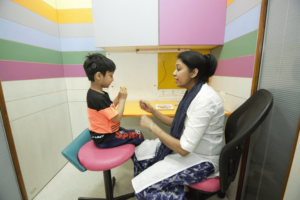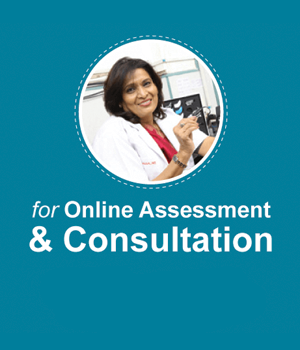



Asha Auditory Verbal Therapy clinic
Auditory Verbal Therapy for teaching deaf children to listen and speak:

How Auditory Verbal Therapy is Different from Speech Therapy?
Auditory Verbal Therapy (AVT) and Speech Therapy are two forms of early intervention programs that aim to help children interact more effectively with the world around them. Both are highly popular among children who are deaf or hard of hearing because the names are frequently used interchangeably. However, there are significant differences between speech therapy and auditory-verbal therapy.
AVT is a family-centered specialty program that helps deaf children and newborns learn to listen and communicate. AV therapy is not the same as speech therapy because it places more emphasis on listening as the foundation for comprehending and improving spoken communication. The auditory-verbal therapy concentrates on improving listening skills to acquire spoken language, but the speech therapy for deaf children focuses on gesture, lip-reading, visuals, and signing.
In Auditory Verbal Therapy, signing, gestures, images, and lip-reading are not forbidden, but parents are encouraged to allow their children to listen first to create the brain pathways that support listening. While doing so, they activate the auditory cortex, a brain region responsible for hearing. The best technology like cochlear implants or hearing aids is needed for this to work.
AVT is effective because it combines good hearing technology with outstanding parent coaching. In the parent training program, parents will be taught how to incorporate listening, thinking, and communication methods into their child’s daily life.
What is the Role of Auditory Verbal Therapists?
The primary role of Auditory Verbal Therapists is to assist parents in making sure their child has access to the right technology so they may experience the entire spectrum of sounds needed to learn how to speak. AVT sessions generally involve the child, their caregivers, and their clinician. In the session, the children will be taught how to listen and communicate through natural interactions such as talking, singing, and playing.
Find here, what auditory-verbal therapists do
- Early detection of hearing loss in newborns, babies, toddlers, and young children, followed by prompt audiology care and auditory-verbal therapy.
- To maximize the benefits of auditory stimulation, they recommend a rapid assessment and the adoption of appropriate cutting-edge hearing technology.
- Guide and train parents on how to assist their child develop listening and spoken language by using hearing as the primary sensory modality.
- Train parents on how to assist their children in integrating listening and spoken language into all aspects of their lives.
- Coach parents to use their children’s natural speech, language, audition, cognitive, and communication development patterns.
- Encourage and mentor parents to use listening as a tool to help their children self-monitor spoken language.
- Conduct continuing formal and informal diagnostic examinations to design tailored auditory-verbal therapy plans, track progress, and assess the success of the programs for the child and family.
Personalized Auditory Verbal Therapy in New Delhi
The benefits of auditory verbal therapy are long-lasting. Especially, with the support of AVT and hearing technology, children can learn to listen, speak effectively, and reach their full potential. If you are seeking the best AVT services near me, then the Asha Speech & Hearing Clinic in New Delhi is the perfect place for you. On our team, the trained professionals Ms. Vandana Bhardwaj and Ms. Anju Kochhar have been offering Auditory Verbal Therapy of Cochlear Implant Program for several years. Book an appointment with us to get personalized AVT from the top Auditory Verbal Therapists in India. Our experts will evaluate the child and come up with effective family-oriented therapy or rehabilitation plans.
Providing Collaborative Care with Leading Hospitals







